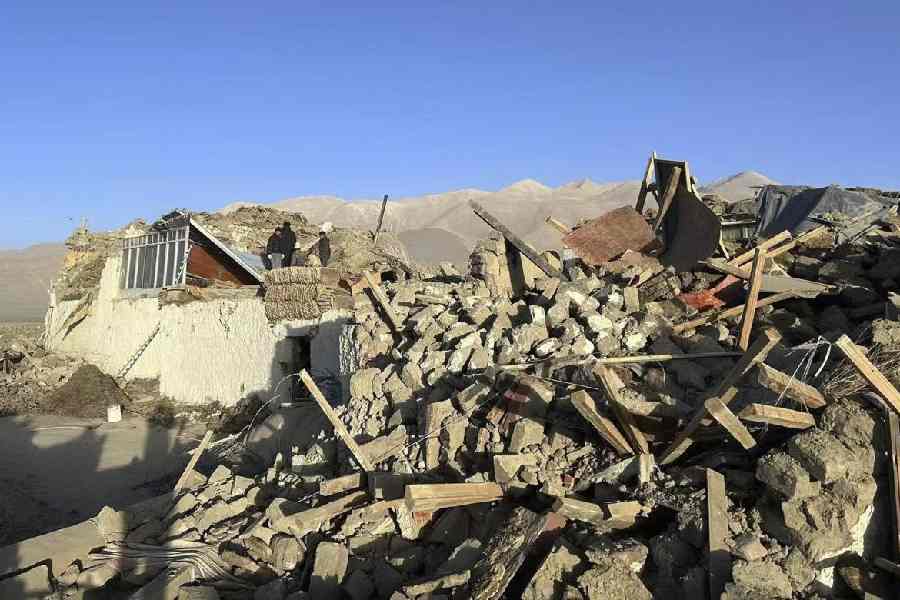There is no sign on the door of the new Hamas political office in Baghdad, and the address is closely guarded. The same goes for the new Houthi office, a short drive away.
Iraqi government officials quietly allowed both Iranian-backed armed groups to establish a more permanent presence in Baghdad early this summer, after years of their representatives visiting. The shift, which Iraqi officials deny publicly even as photos of the groups in Iraq circulate on social media, comes as Iran has appeared to encourage its proxies from different countries to share military skills and even coordinate on targets.
The new offices reflect Iraq’s growing role in the shadow war between Iran, Israel and the US.
For more than 20 years, since the US invasion to oust the Iraqi dictator, Saddam Hussein, Iraq has struggled to maintain an uneasy balance between Iran, with which it shares a 1,000-mile border, and the US, which still maintains about 2,500 troops in the country.
The balance has gradually shifted in favour of Iran. Iraq’s neighbour has worked steadily to amplify its geopolitical sway by expanding recruitment and funding of sympathetic forces inside Iraq. It is part of a larger effort by Tehran to build a regional bloc of Shia power that extends to Lebanon with Hezbollah and to Yemen with the Houthis.
Iran in recent years pushed the Iraqi government to legitimise the country’s Shia militias, some with loyalties to Tehran, as well as affiliated Sunni, Christian and Yazidi armed groups by making them part of Iraq’s security apparatus. The Shia forces have also created successful political parties, a coalition of which won enough seats in the 2021 election to choose the prime minister.
Against that backdrop of Iran’s rising influence, Iraq’s leadership acquiesced when the Houthis and Hamas wanted to open offices. Some Iraqi government officials, according to two of the people who spoke to The New York Times, say privately they are not thrilled about their new guests but did not have the power to block them given the sway of the Iraqi political parties with ties to Iran.
The offices, mainly focused on developing links in Iraq, were established in June, according to Iraqi and Western officials, as well as a member of an Iraqi armed group. They spoke on the condition of anonymity to discuss sensitive topics.
The two new offices, one for Hamas, a Sunni group, and the other for the Houthis, a Shia one, reflect how much Iraq’s politics have changed since the time of Hussein.
Although he was a Sunni Muslim, his regime suppressed Sunni Islamist movements like the Muslim Brotherhood with which Hamas was affiliated. He saw them as a potential threat to the hegemony of his Ba’ath Party. Many Iraqis remained leery of such groups long after Hussein’s fall, not least of all because of the rise of Sunni militants, including Al Qaeda in Iraq and, later, the Islamic State.
As for Shia Muslim movements, they were violently suppressed under Hussein, who feared they would conspire to depose him. Members of such groups were either forced to flee or were imprisoned and executed.
Politics in Iraq today are dominated by Shia parties, with a strong affinity to Iran. The shift has allowed foreign groups with ties to Iran to make inroads, bolstering what is known as Iran’s Axis of Resistance, its armed network across the Middle East that is dedicated to countering American and Israeli influence in the region.
Thomas Juneau, a professor of international relations at the University of Ottawa, said he and other academics have noticed a trend by Iran of encouraging armed groups from different countries to work together. They point to efforts by Iraqi and Lebanese groups on behalf of the regime of Bashar al-Assad during the Syrian civil war.
There is “a growing institutionalisation of relations between Iran’s partners in the Axis of Resistance,” he said. With that end in mind, he said, Tehran has created joint operation rooms and held regular meetings that bring their leaders together, efforts that have “intensified” since Hamas and its allies attacked Israel and the war in Gaza began.
One worry is that the presence of so many Iran-backed groups in Iraq could prompt Israel’s military to strike inside Iraq, further destabilising the region.
Similarly, there are concerns that the Iraqi armed factions will team up more frequently with the Iranian-backed proxies and time their attacks against Israel together. The Iraqi groups, along with the Houthis, claimed to jointly attack Israel eight times in June and three times in July, according to a strike calendar maintained by the Washington Institute, a D.C.-based think tank.
Hamas opened its Baghdad office in Arosat, a middle-class neighbourhood with a mix of two-storey homes built in the 1970s and more recent construction, traversed by streets featuring a smattering of pizza cafes and furniture stores as well as new buildings, some still under construction. Swaths of the area are controlled by Kata’ib Hezbollah, the most prominent and secretive of the Iraqi Shia armed groups loyal to Iran.
The Hamas representative in Baghdad is Mohammed al-Hafi, a member of the Hamas bureau for Arab and Islamic Relations. Reached by phone in August in Baghdad, al-Hafi declined a request to speak with The Times saying, “I do not have permission to speak with the media.”
al-Hafi, whose security detail in Iraq is provided by Kata’ib Hezbollah, has met with a number of Iraqi groups and individuals, both Shia organisations associated with the Axis of Resistance and Sunni groups that share Hamas’s Muslim Brotherhood philosophy.
Hossam al Rubaie, a spokesman for Khadamat, an Iraqi Shia political party affiliated with an armed group close to Iran, said he met with al-Hafi on several occasions. He said the office provides a way for Iraqis to have a direct link with Hamas.
al-Hafi is “a political figure, not a military figure, and having an office allows him to convey messages to Iraqi politicians directly, not through an intermediary,” said al Rubaie.
New York Times News Service











